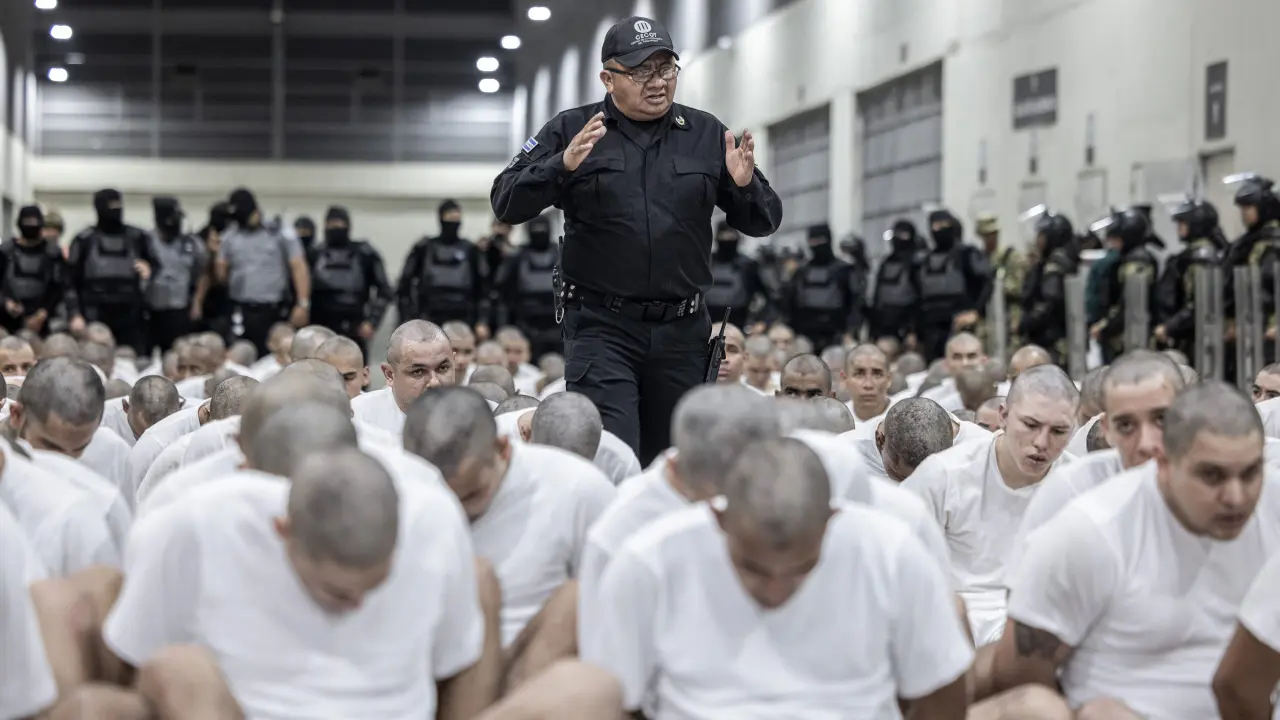The United States has deported hundreds of alleged gang members from the Venezuelan criminal group Tren de Aragua to El Salvador, despite a federal court order attempting to block the removals. This move has sparked controversy over the legality of the deportations, as well as concerns about the treatment of the detainees in El Salvador’s notorious supermax prison.
The Biden administration has defended its actions, arguing that the deportations were lawful and necessary for national security. Meanwhile, human rights organizations and the Venezuelan government have condemned the move, likening it to historical episodes of mass incarceration and deportation.
The Deportations and Legal Challenges
On Sunday, 238 members of Tren de Aragua and 23 members of the international MS-13 gang arrived in El Salvador, where they were immediately transferred to the Terrorism Confinement Center (Cecot), the country’s mega-jail.
The deportations took place under a controversial proclamation issued by President Donald Trump, who invoked the Alien Enemies Act of 1798 to justify the removals. The law, last used during World War II to detain Japanese-Americans, allows the president to deport or detain individuals from enemy nations without due process.
The deportations were carried out even as a U.S. federal judge, James Boasberg, issued a 14-day halt on the removals pending further legal arguments. However, by the time the order was issued, the flights carrying the alleged gang members had already departed.
Reports indicate that the judge verbally instructed officials to turn back the planes, but the written order did not include this directive. The Department of Justice later argued that the court’s ruling was irrelevant, as the individuals were no longer on U.S. soil at the time the order was issued.
Read : US to Not Renew Legal Status for Migrants from Cuba, Venezuela, Haiti, Nicaragua
This legal battle has raised significant constitutional questions about the balance of power in the U.S. government. Under the American system of checks and balances, government agencies are required to comply with judicial rulings.
Today, the first 238 members of the Venezuelan criminal organization, Tren de Aragua, arrived in our country. They were immediately transferred to CECOT, the Terrorism Confinement Center, for a period of one year (renewable).
— Nayib Bukele (@nayibbukele) March 16, 2025
The United States will pay a very low fee for them,… pic.twitter.com/tfsi8cgpD6
Civil rights organizations, including the American Civil Liberties Union (ACLU), have argued that the administration’s actions violated the court order and circumvented due process. The Justice Department has since appealed the ruling, indicating that the issue is far from resolved.
The Role of El Salvador and President Bukele’s Mega-Jail
The deportations highlight the strengthening diplomatic relationship between the United States and El Salvador under President Nayib Bukele. El Salvador was the second country visited by U.S. Secretary of State Marco Rubio earlier this year, during which Bukele proposed taking in deportees to help fund the country’s newly constructed supermax prison.
The facility, which can hold up to 40,000 inmates, has been a cornerstone of Bukele’s aggressive crackdown on organized crime.
Dubbed the Terrorism Confinement Center (Cecot), the prison is known for its harsh conditions and strict security measures. Videos shared by Bukele show deportees from the U.S. being escorted in shackles and lined up inside the facility. According to Bukele, the inmates will be held there for at least one year, with the possibility of indefinite detention.
Human rights groups have criticized Cecot for its treatment of prisoners, citing reports of overcrowding, lack of medical care, and the use of extreme disciplinary measures.
Amnesty International has condemned the mass deportations, accusing the U.S. government of engaging in “racist targeting” of Venezuelans under the guise of national security. Despite these concerns, Bukele has defended his policies, arguing that the prison is necessary to maintain security and combat gang violence.
Political and Humanitarian Repercussions
The deportations have sparked strong reactions from both the Venezuelan government and international human rights organizations. The Venezuelan government has denounced the U.S. decision to invoke the Alien Enemies Act, arguing that it unjustly criminalizes Venezuelan migrants and evokes dark chapters of history, including slavery and Nazi concentration camps.
Officials in Caracas have called for the international community to condemn the deportations and demand accountability from the U.S. government.
In the United States, the move has intensified the debate over immigration policies and the use of executive power. Trump’s decision to designate Tren de Aragua and MS-13 as foreign terrorist organizations has given his administration broad authority to target their members, but critics argue that the classification is overly broad and lacks sufficient evidence.

Many of those deported have not been publicly identified, and no details have been provided about their alleged crimes or gang affiliations. Trump’s hardline stance on immigration was a central theme of his re-election campaign, with promises to conduct the largest deportation operation in U.S. history.
Since taking office, illegal border crossings have declined to historic lows, but the administration has faced criticism for the slow pace of deportations. The latest removals suggest a renewed effort to accelerate these operations, particularly targeting individuals with alleged ties to criminal organizations.
As the legal battle over the deportations continues, questions remain about the fate of those sent to El Salvador. With Cecot’s controversial reputation and the ongoing scrutiny of Bukele’s policies, the treatment of these detainees will likely remain a topic of international concern.
The situation also raises broader questions about the limits of executive power and the role of the judiciary in maintaining legal oversight over government actions.
While the Biden administration has defended its approach, it remains to be seen whether the courts will uphold the use of the Alien Enemies Act in this context. For now, the deportations serve as a stark reminder of the intersection between immigration policy, national security, and human rights in an increasingly polarized political landscape.

